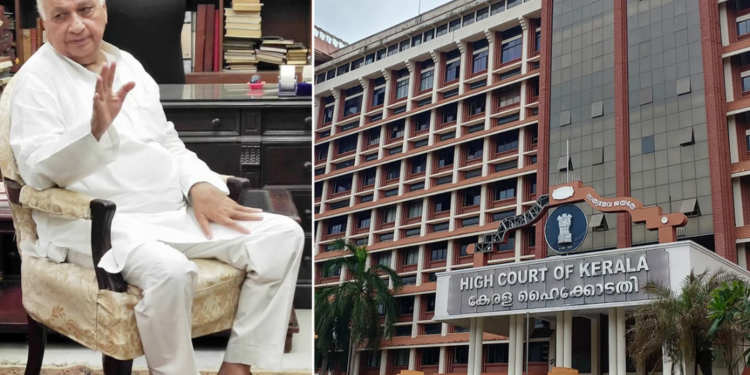The Kerala High Court recently invalidated the student nominations made by Kerala Governor Arif Mohammed Khan to the Senate of Kerala University, of which he serves as the Chancellor [Arunima Ashok and others v. The Chancellor, University of Kerala].
In a judgment issued on May 21, Justice Mohammed Nias CP emphasized the limitations on the Chancellor’s authority when nominating members to the Senate.
The Court determined that the Chancellor’s nominations did not adhere to statutory requirements and clarified that he does not possess unrestricted authority when making such nominations.
Constitutional courts are entitled to intervene when nominations are made unreasonably or fail to meet statutory requirements, the Court stated.
“It is well established that the Chancellor does not possess unfettered authority while making nominations in accordance with statutory provisions. As mentioned earlier, there is a violation of statutory provisions rendering the nominations invalid. Although it involves a nomination, if the nomination made contradicts statutory requirements or fails to consider relevant factors or considers irrelevant factors, which no reasonable person would have done, the Constitutional Courts may intervene with the nominations,” the judgment read.
As a result, the Court directed the Chancellor to nominate new candidates within six weeks.
The Court addressed writ petitions challenging several nominations to the Kerala University Senate.
Typically, Senate members fall into four categories: ex-officio members, elected members, life members, and other members.
Under the category of “other members,” the Chancellor of the University has the authority to nominate four students to the Senate.
According to University regulations, these students must demonstrate outstanding abilities in their respective fields. Additionally, one student should be nominated from each of the four fields: humanities, sciences, fine arts, and sports.
However, Arif Khan’s 2023 decision to nominate Abhishek D Nair (humanities), Dhruvin SL (science), Malavika Udayan (fine arts), and Sudhi Sadan (sports) to the Senate sparked controversy.
Allegations surfaced that some of these nominees were selected due to their affiliation with the Akhil Bharatiya Vidyarthi Parishad (ABVP).
Two writ petitions were filed with the High Court by four students, questioning whether the nominees possessed the outstanding qualities required of them.
The petitioners, claiming to be rank-holders with more achievements than the nominees, argued that they were overlooked for nomination.
It was also argued that the Chancellor did not follow procedural norms when making the nominations.
During proceedings, a statement submitted on behalf of the Chancellor noted that no specific procedure was prescribed for nominations.
Additionally, the statement highlighted that holding a rank did not always indicate superiority over other students.
“The provisions of the Act do not require outstanding performance, which may be reflected through higher ranks in the examinations. The criteria for evaluating a person’s ability will be different,” the statement explained.
The Court agreed that ranks alone were not sufficient indicators of a student’s ability. However, it faulted the Chancellor for completely disregarding the petitioners who were rank-holders.
The Court observed that the Chancellor lacked the authority to nominate students while disregarding rank-holders or students with credentials altogether.
“Rank holders are certainly individuals who should be considered students with outstanding academic ability … Their credentials do not appear inferior to those of the nominated students … While nominations involve an element of discretion, eligibility criteria outlined in the statute cannot be ignored,” the Court stated.
It emphasized that any arbitrary exercise of discretionary powers would violate the principles of equality and non-discrimination enshrined in Articles 14 and 16 of the Indian Constitution.
“Unrestricted and unguided authority is incompatible with the exercise of any power, whether constitutional or statutory. It is well-established that even in the exercise of discretionary power, reasonableness, rationality, impartiality, fairness, and equity are inherent and must be upheld, rather than relying on personal opinions,” the Court concluded.
Consequently, the Court annulled the student nominations made by the Chancellor.
In the same judgment, the Court dismissed a writ petition filed by academician Dr. KN Madhusudanan Pillai, who contested the nomination of three State nominees to the Senate (Muralidharan Pillai, Dr. Shiju Khan JS, and R Rajesh).
The academician argued that these nominees lacked the necessary experience in higher education.
However, the Court disagreed, finding that these nominees possessed adequate experience. It further noted that pending criminal cases against some of them did not disqualify their nominations. Accordingly, the Court dismissed the writ petition challenging these nominations.
The student petitioners (Arnunima Ashok, Kavya TS Nanda Kishore, and Avanth Sen) were represented by senior advocate Elvin Peter along with advocates KR Ganesh, Gouri Balagopal, Sreelakshmi AS, MA Asif, and Anwin John Antony.
Dr. KN Madhusudanan Pillai was represented by advocates S Biju, Jaishankar V Nair, Parshathy SR, John Gomez, and Achuth Krishnan R.
Senior advocate P Sreekumar along with standing counsel S Prashant represented the University Chancellor.
Standing counsel Thomas Abraham represented Kerala University.
Advocates RV Sreejith, TC Krishna, C Dinesh, and Suvin R Menon appeared for the student nominees whose nominations were revoked.
Special government pleader TB Hood appeared for the State.

















